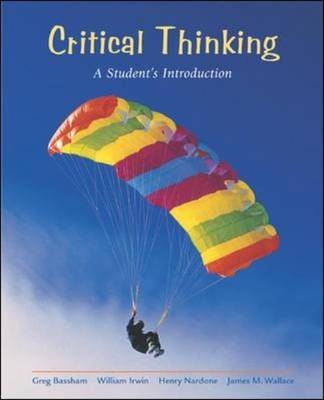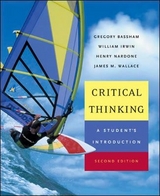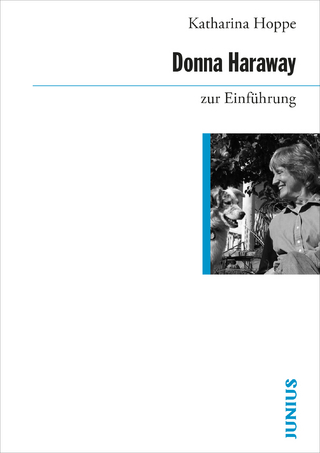
Critical Thinking
McGraw Hill Higher Education (Verlag)
978-0-07-284085-8 (ISBN)
- Titel erscheint in neuer Auflage
- Artikel merken
From the authors who brought you "The Simpsons and Philosophy", "The Matrix and Philosophy", and "The Lord of the Rings and Philosophy", "Critical Thinking: A Student's Introduction", is a clear, learner-friendly text that helps today's students bridge the gap between everyday culture and critical thinking. The text covers all the basics of critical thinking, beginning where students are, not where we think they should be. Its comprehensiveness allows instructors to tailor the material to their individual teaching styles, resulting in an exceptionally versatile text.
1. Introduction to Critical Thinking What is Critical Thinking?Critical Thinking StandardsThe Benefits of Critical ThinkingBarriers to Critical ThinkingCharacteristics of a Critical ThinkerChapter Summary 2. Recognizing Arguments What Is an Argument? / Identifying Premises and Conclusions / What Is Not an Argument? / Chapter Summary 3. Basic Logical Concepts Deduction and Induction / How Can We Tell Whether an Argument is Deductive or Inductive? / Common Patterns of Deductive Reasoning / Common Patterns of Inductive Reasoning / Deductive Validity / Inductive Strength / Testing for Validity / Chapter Summary 4. Language The Role of Language in the Assessment of Arguments / Deciding Whether a Premise is True or False / Precision and Personal Viewpoint in Our Own Arguments / Finding the Right Words: The Need for Precision / The Importance of Precise Definitions / Emotive Language: Slanting the Truth / Euphemism and Political Correctness / Chapter Summary 5. Logical Fallacies 1-The Concept of Relevance / Fallacies of Relevance / Chapter Summary 6 Logical Fallacies 2-Fallacies of Insufficient Evidence / Chapter Summary 7. Analyzing Arguments Diagramming Short Arguments / Summarizing Longer Arguments / Chapter Summary 8. Evaluating Arguments When Is an Argument a Good One? / When Is It Reasonable to Accept a Premise? / Chapter Summary Appendix: Sample Critical Essay 9. Getting Deeper into Logic: Categorical Reasoning Categorical Statements / Translating into Standard Categorical Form / Categorical Syllogisms / Chapter Summary 10. Getting Deeper into Logic: Propositional Logic Conjunction / Conjunction and Validity / Negation / Deeper Analysis of Negation and Conjunction / Disjunction / Conditional Statements / Chapter Summary 11. Inductive Reasoning Introduction to Induction / Inductive Generalizations / Statistical Arguments / Induction and Analogy / Induction and Causal Arguments / A Few Words about Probability / Chapter Summary 12. Finding, Evaluating and Using Sources Finding Sources / Refining Your Search / Directional Information / Informational Sources / Evaluating Sources / The Audience / Taking Notes / Using Sources / Acknowledging Sources / Chapter Summary 13. Writing Argumentative Essays Writing a Successful Argument / Before you Write / Writing the First Draft / After the First Draft / Sample Argumentative Essay / Chapter Summary 14. Thinking Critically About the Media The Mass Media / The News Media: Message vs. Meaning, Information vs. / Knowledge / Getting us to Pay Attention: What Really Drives the Media / Keeping Our Interest: The News as Entertainment / Media Literacy / Advertisements and the Media / Chapter Summary 15. Science and Pseudoscience The Basic Pattern of Scientific Reasoning / The Limitations of Science / How to Distinguish Science from Pseudoscience / Two Case Studies in Pseudoscience and the Paranormal / Chapter Summary Answers to Selected Exercises Glossary / Index
| Erscheint lt. Verlag | 1.6.2002 |
|---|---|
| Verlagsort | London |
| Sprache | englisch |
| Maße | 185 x 231 mm |
| Gewicht | 878 g |
| Themenwelt | Geisteswissenschaften ► Philosophie |
| ISBN-10 | 0-07-284085-4 / 0072840854 |
| ISBN-13 | 978-0-07-284085-8 / 9780072840858 |
| Zustand | Neuware |
| Haben Sie eine Frage zum Produkt? |
aus dem Bereich



